Q&A: MARIA ARMOUDIAN, Journalist/Radio Host
Written on August 12th, 2011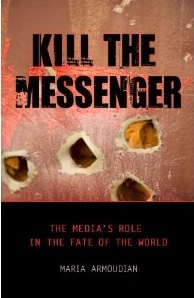 |
Aired 08/08/11
KILL THE MESSENGER emerged from MARIA ARMOUDIAN's studies into the causes of genocide, war, peacemaking, democratization, and the protection of human rights and the environment, while she was working on her Ph.D. at the University of Southern California, as well as during her work as a broadcast journalist and public official. Looking across conflicts and policy successes and failures, she found that media (and media professionals) were among key factors in determining political outcomes, including matters of life and death.
Written in five parts, KILL THE MESSENGER shows how media fomented rage and genocide in Rwanda, the Holocaust and the Bosnian war; how they helped bring peace in the Northern Ireland Conflict and the war in Burundi; how media contributed to democratization and the protection of human rights in South Africa, Taiwan, Mexico, and Senegal, and how they aided both the destruction and rebuilding of democracy in Chile. In its final case study, Kill the Messenger explores the media's role in the fate of the world, as journalists disentangle the issue of climate change for the public.
The book's forward was written by Tom Hayden.
Q&A: LESTER BROWN, Worldwatch Institute
Written on April 14th, 2011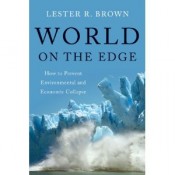 |
Aired 04/10/11
LESTER BROWN has been described by the Washington Post as "one of the world's most influential thinkers." After working with the Department of Agriculture in international agricultural development, Brown helped establish the Overseas Development Council, then founded the Worldwatch Institute, which plays an important role in the public's understanding of trends in our global environment with its annual State of the World report and Vital Signs. In 2001, he left Worldwatch, founded Earth Policy Institute, and continues his vital work. During a career that began with tomato farming, Brown has been honored with numerous prizes, including the MacArthur "Genius" Fellowship, the United Nations Environment Prize, and Japan's Blue Planet Prize, along with some 20 honorary degrees.
In his new book, WORLD ON THE EDGE: HOW TO PREVENT ENVIRONMENTAL AND ECONOMIC COLLAPSE, BROWN lays out the symptoms, the diagnosis, and the cure, what he calls "Plan B". He estimates that we could solve all the world's greatest problems for $200B a year - less than a third the US defense budget - but it will take an all-out response at wartime speed proportionate to the magnitude of the threats facing civilization.
Q&A: Mark Hertsgaard, Author – HOT: Living Through the Next 50 Years on Earth.
Written on January 24th, 2011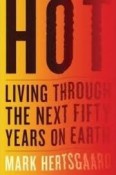 |
Aired 01/23/11
MARK HERTSGAARD, a fellow of The Open Society Institute, The Nation's environment correspondent, covers climate change for Vanity Fair, Time and Die Zeit and has written for many of the world's leading newspapers and magazines. He is the author of the highly acclaimed study of the media during the Reagan years, On Bended Knee, as well as Earth Odyssey; A Day in the Life: The Music and Artistry of the Beatles; The Eagle's Shadow, and his newest, HOT: Living Through the Next 50 Years on Earth.
Q&A: John Warner/Paul Anastas – founders Green Chemistry and co-authors of Green Chemistry
Written on November 23rd, 2010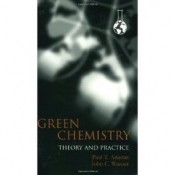 |
Aired 11/21/10
JOHN WARNER and Paul Anastas are the founders of green chemistry and co-authors of Green Chemistry: Theory and Practice, in which, they establish 12 guiding principles for chemists. In 1996 Warner left a lucrative job at Polaroid to found the nation's first doctoral program in green chemistry, and in 2007 he founded Warner Babcock Institute for Green Chemistry, an innovation incubator, in Wilmington, Mass.
Green Chemistry is a revolutionary approach to the way that products are made; it is a science that aims to reduce or eliminate the use and/or generation of hazardous substances in the design phase of materials development. It requires an inventive and interdisciplinary view of material and product design. Green Chemistry follows the principle that it is better to consider waste prevention options during the design and development phase than to dispose or treat waste after a process or material has been developed.
Q&A: DALE BELL & HARRY WILAND – documentary producers – GROWING GREENER SCHOOLS
Written on March 29th, 2010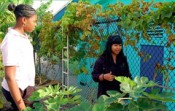 |
Aired 03/28/10
DALE BELL and HARRY WILAND, producers of the documentary GROWING GREENER SCHOOLS which will air on PBS stations in the month of April.
Across the country -- from elite neighborhoods to inner cities - a green school-based curriculum leads to increased test scores and more proficient learning. Students benefit from from more exposure to natural day lighting, fresh lunches or an eco-friendly school campus. Where the transformation has taken place, the results, are profound, especially in the face of a national consensus that our public schools are failing.
DALE BELL and HARRY WILAND, co-founders of the Media & Policy Center, are veteran film makers who, between them, have won an Academy Award (for Woodstock), five Emmys, one Peabody, two Christophers and two Cine Golden Eagles. They are both Ashoka Fellows, recognized as social entrepreneurs who use media effectively and creatively to inspire citizen action.
http://www.growinggreenerschools.org/
http://www.mediapolicycenter.org/
